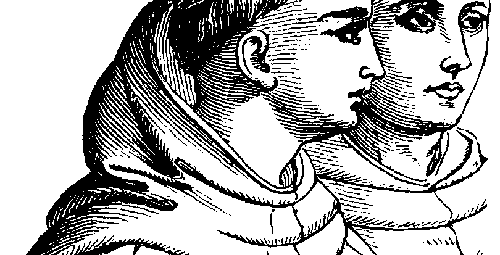(By Crystal Holmes)
Why did God forbid things like seething a kid in his mother’s milk, wearing garments made of wool and linen, or rounding the corners of your head? Why not let an ox and an ass plow together? Why not mix your seeds or practice crossbreeding? What’s wrong with these things? This paper will examine these commandments (and a few others) that seem strange to most people. We will see WHY God gave these commandments and why you should keep them.
Seething a Kid in His Mother’s Milk
Exodus 34:26. The first of the firstfruits of thy land thou shalt bring into the house of the LORD thy God. Thou shalt not seethe a kid in his mother’s milk. (See also Exodus 23:19).
Many have said that eating milk and meat together is bad because it hampers digestion and assimilation of the calcium and iron. Others have simply said that it means you should not butcher the kid and the mother in the same day, or that you would have to use separate utensils for kids and other goats or sheep. But is that really what it means?
Let’s begin by looking at this verse in context. The context is driving out the pagan peoples of the land.
Exodus 34:11-13. Observe thou that which I command thee this day: behold, I drive out before thee the Amorite, and the Canaanite, and the Hittite, and the Perizzite, and the Hivite, and the Jebusite. But ye shall destroy their altars, break their images, and cut down their groves: For thou shalt worship no other god: for the LORD, whose name is Jealous, is a jealous God:
God also told them to not even make mention of the names of other gods – not even to talk about them:
Exodus 23:13. And in all things that I have said unto you be circumspect: and make no mention of the name of other gods, neither let it be heard out of thy mouth.
Why? Why did God forbid them from even saying a pagan god’s name? Because He did not want them to make covenants with the inhabitants of the land! He did not want His people to mingle with those pagans, sacrifice to their gods, or learn their abominable practices!
Exodus 34:15. Lest thou make a covenant with the inhabitants of the land, and they go a whoring after their gods, and do sacrifice unto their gods, and one call thee, and thou eat of his sacrifice;
God is a jealous God, and He does not want Israel defiling herself by mingling with the heathen in the land – who are so evil and profane that God is driving them out. God wants a CLEAN people! And the only way to have that purity is to drive out the people and destroy their religion. Afterwards, Israel was commanded to keep three feasts to God (Exodus 34:18-23), and God says that His sacrifices are not to be offered with leaven. Leavened bread symbolizes sin, as Jesus alluded to when He spoke of the leaven of the Pharisees and Sadducees (Matthew 16:12), and as Paul mentioned when delivering sinful people to Satan for the destruction of the body (1 Corinthians 5:1-9).
Exodus 34:25-26. Thou shalt not offer the blood of my sacrifice with leaven; neither shall the sacrifice of the feast of the passover be left unto the morning. The first of the firstfruits of thy land thou shalt bring unto the house of the LORD thy God. Thou shalt not seethe a kid in his mother’s milk.
So, you see, the context of seething a kid in his mother’s milk has something to do with driving out the pagan peoples of the Promised Land and then making pure offerings to God by His standards. The pagan peoples seethed kids in their mothers’ milk during their harvest season, because they were worshiping the gods of fertility and prosperity. While driving out other people, it would have been easy for the Hebrews to begin practicing the religion of the pagans. They would have to destroy their altars and other pagan religious items, so they would see them and handle them. They would ask the natives how they served their gods and then begin to serve them themselves. They did this in the days of the judges!
Judges 2:3, 12. Wherefore I also said, I will not drive them out from before you; but they shall be as thorns in your sides, and their gods shall be a snare unto you…. And they forsook the LORD God of their fathers, which brought them out of the land of Egypt, and followed other gods, of the gods of the people that were round about them, and bowed themselves unto them, and provoked the LORD to anger.
Adam Clarke’s Commentary concurs that the commandment against seething a kid in his mother’s milk was based on the practices of the pagans in the lands God was driving out:
This passage has greatly perplexed commentators; but Dr. Cudworth is supposed to have given it its true meaning by quoting a [manuscript] comment of a Karaite Jew, which he met with, on this passage. ‘It was a custom of the ancient heathens, when they had gathered in all their fruits, to take a kid and boil it in the milk of its dam; and then, in a magical way, to go about and besprinkle with it all their trees and fields, gardens and orchards; thinking by these means to make them fruitful, that they might bring forth more abundantly in the following year. Wherefore, God forbad his people, at the time of their in-gathering, to use any such superstitious or idolatrous rite.’ –Cudworth on the Lord’s Supper.
This was a superstition of the pagans whereby they paid homage to their gods of fertility and prosperity. This was how the pagans celebrated THEIR harvest festival! They hoped that their fields and trees would be more fruitful in the following year if they sprinkled them with the kid who was boiled in his mother’s milk. And so God was justifiably worried that the Israelites would mix these pagan traditions with HIS harvest festivals!
This was a thoroughly PAGAN practice! That’s why God forbade it! He didn’t want His people to follow the pagan rites and worship false gods. Following some magical voodoo they had learned from the people they were supposed to be displacing meant they were rejecting God and His law. Almighty God ALONE was responsible for their prosperity and growth. He ALONE would bless them for being obedient to Him. This particular commandment was simply a magnification of the general commandment:
Deuteronomy 12:30. Take heed to thyself that thou be not snared by following them, after that they be destroyed from before thee; and that thou enquire not after their gods, saying, How did these nations serve their gods? even so will I do likewise.
Mingling Seeds
What do you think of the following commandment?
Leviticus 19:19. Ye shall keep my statutes. Thou shalt not let thy cattle gender with a diverse kind: thou shalt not sow thy field with mingled seed….
God is talking about crossbreeding here. He does not want you trying to mix cattle with other species, or any animals of different species. But just as God does not want you to mix different species, He does not want you – a believer – to be mingled with an unbeliever. He does not want light and darkness, righteousness and unrighteousness, the God-fearing and the God-hating, to be mixed together.
2 Corinthians 6:14. Be ye not unequally yoked together with unbelievers: for what fellowship hath righteousness with unrighteousness? and what communion hath light with darkness?
God wants His people to be separate – to be holy – just as He is holy. Mixing paganism with truth does not work, and God will not stand for it or support someone who does it.
But now for more on the physical application of this commandment. Trying to cross a watermelon and an apricot doesn’t work. Trying to cross a cow with a camel doesn’t work. But mixing two very close species produces an offspring that has different traits than its parents. They may be better or worse than the parents, but they are almost always different. For thousands of years now, gardeners have been practicing horticultural selection to produce new and better plants.
Take, for instance, the cruciferous vegetables. This group of vegetables includes cabbage, kale, kohlrabi, collards, broccoli, cauliflower, and Brussels sprouts, just to name a few. ALL of these varieties of this one species (Brassica Oleracea) came from one type of plant – wild cabbage. This is accomplished by saving and planting seeds from the individual plants that had a trait that the farmer wanted in the offspring. One plant may produce a big head while another would withstand the cold weather better. So, the farmer would plant seeds from these two parent plants next to each other so that they could cross-pollinate and, after a few generations, produce an offspring that had both qualities. This process eventually produces a new species, and if taken far enough produces a plant that can no longer reproduce because of a very narrow genetic pool; these plants are called hybrids.
This process is not wrong. Nearly all food in the supermarkets today have undergone this process to some extent. But crossbreeding plants and animals was also a pagan practice. By mixing certain seeds or animals together, they believed that their harvests would be more bountiful the next year. But the pagans were not after better genetics. They were after better MAGIC. They did not plant crops together because they wanted to combine the traits or produce a better plant. They planted them together because this plant was the plant of Ba’al, and this plant was the plant of Astarte, and when you planted them together their energy warded off bad luck, or created a good vibe that led to increased fertility and prosperity. Or something like that.
Maimonides, the 12th century Jewish historian, writes in his work “The Guide for the Perplexed”, Book 3, Chapter 30 (my emphasis is in bold):
On examining these old and foolish doctrines we find that it was most generally believed by the people that by the worship of stars the earth will become inhabited, and the ground fertilized. The wise, pious, and sinfearing men among them reproved the people and taught them that agriculture, on which the preservation of mankind depended, would become perfect and satisfy man’s wishes, when he worshipped the sun and the stars. If man provoked these beings by his rebelliousness, the towns would become empty and waste.
When a tree is grafted into another in the time of a certain conjunction of sun and moon, and is fumigated with certain substances whilst a formula is uttered, that tree will produce a thing that will be found exceedingly useful….
Thus, we see that these commandments were given because the pagans God was driving out were practicing these things and He did not want His people to practice them. God knows how perverted our current world is, and He looks at your heart. If you want God’s truth, you must be separate from the world, not mixed into it. If you eat crossbred food because you want to be more fertile or you want to have a better magical energy, then you are sinning. If you don’t care whether the food is crossbred or not – if the idol is nothing to you (1 Corinthians 8:4) – then you may eat all you desire with a pure conscience.
Hair Cuts and Grooming
Here are two commandments about how to cut your hair:
Leviticus 19:27. Ye shall not round the corners of your heads, neither shalt thou mar the corners of thy beard.
Deuteronomy 14:1. Ye are the children of the LORD your God: ye shall not cut yourselves, nor make any baldness between your eyes for the dead.
The pagan priests would trim the corners of their heads and their beards, much like monks have done. You’ll note, however, that almost everyone has a ridge on their head where the frontal and parietal bones join. This is the ridge whose highest point is at or near the “crown”. And what do pagan priests do? They shave the hair off the crown, creating what has been termed a tonsure (Figure 1). Some who prefer to keep their heads mostly bald (or have trouble growing hair) may opt for wearing a thin ring of hair around their heads, called a “monastic crown” (Figure 2). The modern-day Jewish skull cap (or kippah) also is a type of tonsure (Figure 3).
 Figure 1. |
 Figure 2. |
 Figure 3. |
The tonsure was a pagan practice because by it, they showed obedience to the sun god! Note what Alexander Hislop in his “The Two Babylons” Chapter 6, Section 2, writes (my emphasis is in bold):
Now, as Rome set so much importance on this tonsure, let it be asked what was the meaning of it? It was the visible inauguration of those who submitted to it as the priests of Bacchus. This tonsure cannot have the slightest pretence to Christian authority. It was indeed the “tonsure of Peter,” but not of the Peter of Galilee, but of the Chaldean “Peter” of the Mysteries. He was a tonsured priest, for so was the god whose Mysteries he revealed. Centuries before the Christian era, thus spoke Herodotus of the Babylonian tonsure: “The Arabians acknowledge no other gods than Bacchus and Urania [i.e., the Queen of Heaven], and they say that their hair was cut in the same manner as Bacchus’ is cut; now, they cut it in a circular form, shaving it around the temples.”
Maimonides adds (Book 3, Chapter 37): “We have explained in our large work that it is prohibited to round the corners of the head, and to mar the corners of the beard, because it was the custom of idolatrous priests.”
So the practice of trimming the corners of the head and beard are actually pagan practices and should not be practiced as such.
But what of “making baldness between your eyes for the dead”? This is another pagan practice. The Israelites were not allowed to make themselves bald at all when mourning. They could not cut themselves or their hair because that’s what the pagans did when they mourned. Notice God’s commandment contrasted with what the priests of Baal did when he did not answer their prayers:
Leviticus 21:1, 5-6. And the LORD said unto Moses, Speak unto the priests the sons of Aaron, and say unto them, There shall none be defiled for the dead among his people…. They shall not make baldness upon their head, neither shall they shave off the corner of their beard, NOR MAKE ANY CUTTINGS IN THEIR FLESH. They shall be holy unto their God, and not profane the name of their God….
1 Kings 18:26-28. And they took the bullock which was given them, and they dressed it, and called on the name of Baal from morning even until noon, saying, O Baal, hear us. But there was no voice, nor any that answered. And they leaped upon the altar which was made…. And they cried aloud, and CUT THEMSELVES AFTER THEIR MANNER WITH KNIVES AND LANCETS, till the blood gushed out upon them.
God wants a HOLY people who will take care of their bodies as the temple of the Lord (1 Corinthians 6:19), not people who will wound themselves and mourn for pagan gods.
God wants you to worship Him – and Him alone – and He wants you to honor Him with your body, including your hair cut, and not pagan customs and superstitions!
Clothing
Now, for perhaps the two most famous clothing-related scriptures. And also some of the most misunderstood scriptures.
Leviticus 19:19. …neither shall a garment mingled of linen and woollen come upon thee.
Deuteronomy 22:5. The woman shall not wear that which pertaineth unto a man, neither shall a man put on a woman’s garment: for all that do so are abomination unto the LORD thy God.
First notice that wearing either woollen garments or linen garments were permitted. When someone had a plague of leprosy, the garment was to be examined, “Whether it be in the warp, or woof; of linen, or of woollen; whether in a skin, or in any thing made of skin” (Leviticus 13:48). These were garments made of EITHER wool OR linen, NOT wool AND linen. Also notice that the virtuous woman of Proverbs 31 is hailed for seeking wool and flax (of which linen is made) and for working with her hands to provide for her family.
Proverbs 31:13. She seeketh wool, and flax, and worketh willingly with her hands.
The pagan priests wore garments made of linen and wool woven together. They believed that wearing wool and linen in this way (just like they believed that mixing cattle and hybridizing seeds) would impart some kind of magical blessing on them. They also would cross-dress, the women dressing as men in front of certain gods, and the men dressing as women in front of other certain gods. This commandment has NOTHING to do with women being forbidden from wearing pants or shorts. God really does not care what you wear so long as it is not used in idolatrous practices or have images or words from false gods on it, and it is appropriately modest.
Maimonides, in Book 3, Chapter 37, continues:
…because it was the custom of idolatrous priests. For the same reason, the wearing of garments made of linen and wool is prohibited: the heathen priests adorned themselves with garments containing vegetable and animal material, whilst they held in their hand a seal made of a mineral. This you find written in their books. The same is also the reason of the precept, “The woman shall not wear that which pertaineth unto a man” (Deut. xxii. 5). You find it in the book Tomtom, that a male person should wear coloured woman’s dress when he stands before Venus, and a female, when standing before Mars, should wear a buckler and other armour. I think that this precept has also another reason; namely, that the interchange of dress creates lust and leads to immorality.
* * * * * * * * * *
What is the conclusion of the whole matter? These seemingly odd commandments are in fact legitimate. They were given because a rebellious and stiff-necked people who had no faith wanted (and needed!) God to spell out every little thing they could and could not do. But if you aren’t consciously worshiping Venus or Mars or any other false god, then you don’t need to worry about this commandment. If you aren’t thinking about the magical powers you might get by mixing seed, then don’t be concerned about eating hybridized food. In short, if the REASON for God’s giving the commandment no longer exists, then there is NO REASON to continue keeping those commandments.
Those rules aren’t relevant to our society. But the same concept applies to our modern, corrupt society. There are many customs that would tempt carnal people back into the pagan religious mysteries. For example, there is nothing wrong in itself with eating black-eyed peas on New Year’s Day. But it is a custom and superstition used by people to serve modern-day false gods.
If YOU were writing laws for a people who couldn’t judge right from wrong based on a minimal framework of Law, you would write out all the rules, including “Thou shalt not eat black-eyed peas on New Year’s Day.” This is all God did in writing these seemingly odd commandments for a carnal people. But He wants a people who don’t NEED to have EVERYTHING written out for them. It is up to you to judge yourself now, because God is judging people and selecting those who will rule with Him in His Kingdom. And He is doing this NOW!
1 Peter 4:17. For the time is come that judgment must begin at the house of God: and if it first begin at us, what shall the end be of them that obey not the gospel of God?
It is okay if you want to eat meat and milk at the same meal, which, by the way, must be acceptable if Abraham, the father of faith, did it and was not rebuked for it (Genesis 18:8). It is okay if you want to butcher a kid and his mother in the same day. It is okay if you want to trim your beard or the hair around your temples. It is okay if you want to pluck your eyebrows. It is okay if you want to wear linen clothes or wool clothes. It is even okay if you want to wear clothes made of linen and wool since no one in our society would worship the heathen gods in that fashion.
But it is NOT OKAY for you to practice the rites of God-hating pagans! And if you do so, you will be DESTROYED!
Psalm 145:20. The LORD preserveth all them that love him: but all the wicked will he destroy.

